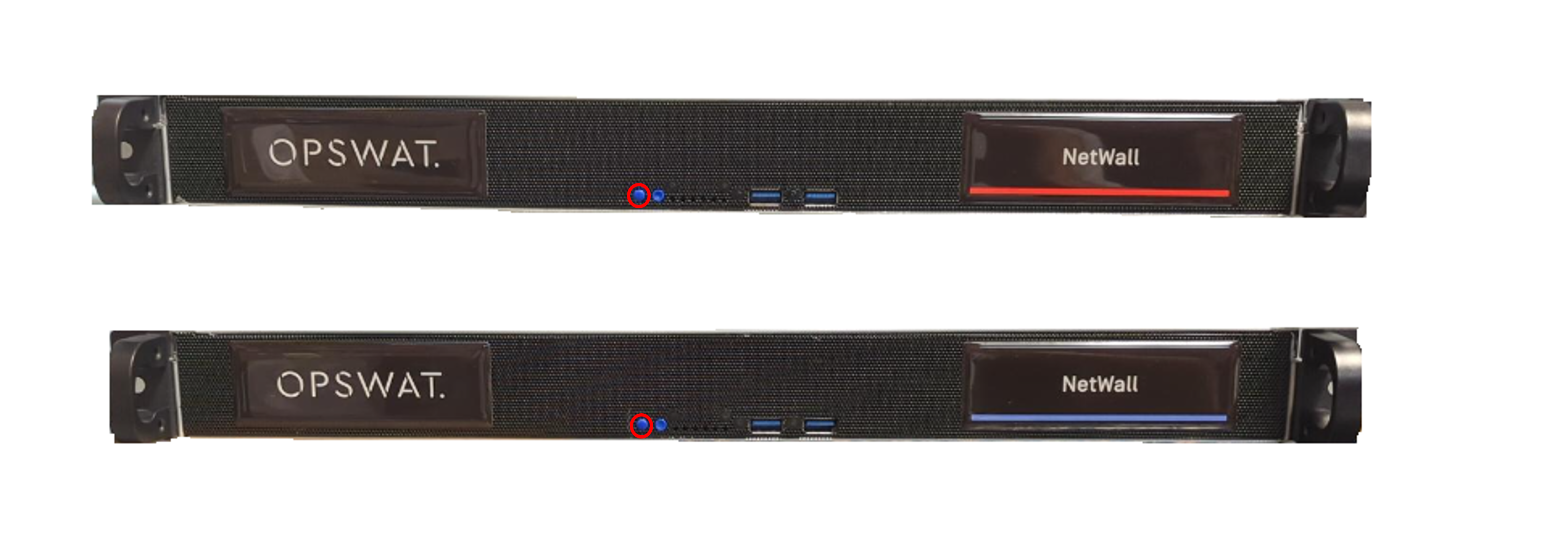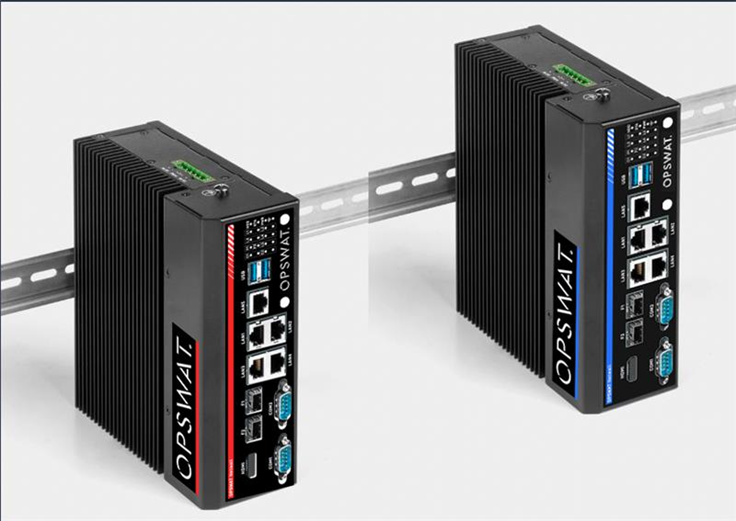Title
Create new category
Edit page index title
Edit category
Edit link
NetWall Diode Setup
Prerequisites
| Parameter | Limits |
|---|---|
| Temperature | -10-35ºC Operating -40-65ºC Non-Operating |
| Humidity | 5-95% non-condensing, Non-Operating 10-80% RH, Operating |
| Item | Limits |
|---|---|
| Type / Watts | 250 Watts |
Hardware requirements
If any items you are supposed to receive are missing or damaged, contact Support.
You will receive a package from OPSWAT containing the following:
- Two 1U or Din Rail servers.
- Mounting rail kits.
- Two power cables.
- Fiber Optic cable.
- Two security dongles.
In addition, you must have:
- Flathead screwdriver.
- Ethernet cables.
The installation location must provide:
- Access to the USB port on the NetWall Diode BLUE node. Ports are available on the front and back of the node.
- 2 x 1U rack space.
- 250 Watts power in the rack where the nodes will be installed.
Installation procedure
NetWall Diode node installation includes the following steps:
- Install the servers in the rack.
- Connect the servers to your system.
- Connect the servers to each other.
- Power up each node.
Install servers in the rack
Install each server in the rack with the supplied mounting rails, following your local procedures.
The sides containing the USB ports should be toward the front of the rack. You will insert a dongle in the USB port of the NetWall Diode BLUE node and the Windows Host computer.
Connect servers to you system
The following graphic shows the rear view of the server.

Use the following table to connect both servers to your system. You will not need all of the connections for the NetWall Diode installation.
| Port Number | Description | NetWall connection |
|---|---|---|
| 1 | Power supply Unit | Connect NetWall BLUE and NetWall RED to their power supplies with the power cables. |
| 2 | Redundante Power supply Unit | Connect NetWall BLUE and NetWall RED to their power supplies with the power cables. |
| 3 | RJ45 LAN Port (LAN3) | N/A. |
| 4 | COM Port (COM1) | N/A. |
| 5 | COM Port (COM2) | N/A. |
| 6 | RJ45 LAN Port (LAN2) | N/A. |
| 7 | RJ45 LAN Port (LAN1) | NetWall BLUE: Connect to the trusted network with an Ethernet cable. NetWall RED: Connect to the untrusted network with an Ethernet cable. |
| 8 | Line In | N/A |
| 9 | SFP1 Slot | NetWall BLUE: Connect SFP TX here. NetWall RED: Connect SFP RX here. |
| 10 | SFP2 Slot | NetWall BLUE: Connect redundant SFP TX here. NetWall RED: Connect redundant SFP RX here. |
| 11 | USB 3.2 Gen 2 Ports | N/A. |
| 12 | HDMI Port (HDMI1) | Connect to a HDMI monitor to access the CLI. |
| 13 | DisplayPort (DP1) | N/A. |
| 14 | D-Sub Port (VGA1) | Connect to a VGA monitor to access the CLI. |
| 15 | USB 3.2 Gen 2 Port | N/A. |
| 16 | USB 3.2 Gen 2 Type-C Port | N/A. |
| 17 | USB 3.2 Gen 2 Ports | N/A. |
| 18 | Line Out | N/A. |
| 19 | Microphone | N/A. |
Connect servers to each other
Use the fiber optic cable to connect the servers to each other. Install the cable connector on each end of the fiber optic cable into the connector, indicated by '9' (or '10' in case of the redundant path) on the above table, on each server.
- Make sure both servers are powered off before connecting them.
- Stand on an electrostatic mat to connect the nodes.
- Computer cables should always use strain relief to protect the connected equipment from excessive force via the cable. This is especially important for cables between racks.
Power up NetWall appliances
Press the power button on each NetWall appliance to power it up. Press each power button a second time to shut down that appliance. You also can reset the appliance pressing the other button placed to the right.

Din Rail format
OPSWAT also can provide costumers with NetWall Diode in Din Rail format for industrial environments as mentioned before. In the case of the DIN Rail format, only the first SFP is used.

MetaDefender

